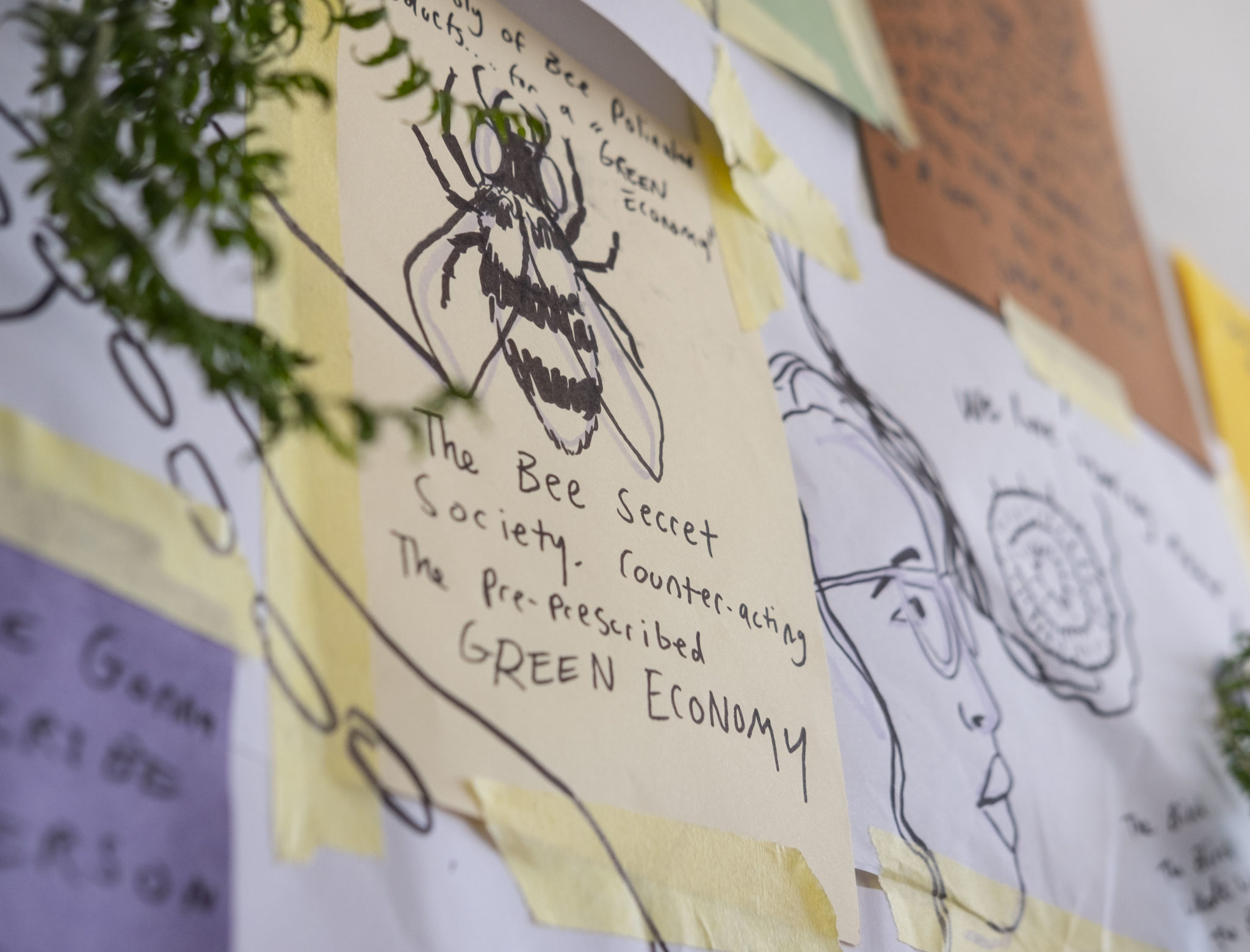Supported by a project grant from the Arts Council, and as part of the national Season for Change, in summer and autumn 2018 ONCA hosted a series of sci-fi inspired workshops, talks and installations.
TRANSCRIPT
Hi, I’m Persephone. I am the director at ONCA. This summer we ran an amazing programme of events and activities here in Brighton, called ‘Visionary Fictions’.
Visionary Fictions was inspired by two amazing writers and thinkers: Walidah Imarisha, who actually coined the term ‘Visionary Fictions’ to describe sci-fi that envisions just and habitable worlds, and Donna Haraway who coined the term ‘Staying With The Trouble’ to describe the task that communities could take on into the future of living in and restoring damaged places.
The amazing Jacob V Joyce launched the programme with a workshop on writing speculative fiction and they challenged us to imagine futures which are off limits, structurally or ideas-wise to us. To challenge them, to challenge those limits and imagine things differently.
After that Jacob came back actually to be part of it to this amazing symposium that we held with Jacob illustrating and Karla Sweet, who is a writer based in London, and Walidah Imarisha, and also two local eco-poets came and ran workshops.
And then we had a scratch night where performing artists generously shared their visionary fictions. That symposium day took place in an extraordinary context – an installation by HOAX Theatre. They came with a number of bags full of recycled and repurposed tents and sleeping bags from festivals that they had made them into this cave. With which they took over the gallery and turned it into a kind of, into an immersive installation. From that, they also performed their show which is called ‘stuck’, which deals with despair around climate change. It’s a clown show. It’s funny and it’s disturbing. Having said that, it’s entirely original and brilliant.
After HOAX and our symposium we had the marvellous Beverly Naidus from Washington State. She came with her installation which is called ‘We Almost Didn’t Make it’. It deals directly with despair and overwhelm around environmental change and social injustice. She turned the gallery into a space in which you actually were kind of like enveloped by what she describes as trauma curtains. And you have to kind of fight your way through this suffocating installation in which you’re faced with all these terrible statistics and overwhelming fears and you kind of make your way through to something that Beverly calls the portal of possibilities, where you’re invited to imagine yourself as an ancestor. To image the world is here in 150 years and you have descendants and you’re leaving a message, some advice or a promise for them. And then Beverly was joined by Joan Haran for a fabulous talk about the artist’s role and how to keep socially engaged creative practice resilient.
Straight after Beverly, we had Irene Fubara-Manuel’s digital installation ‘Dream of Disguise’. This is a game in which you are invited to imagine that you are a migrant crossing at international boundary, at a border. At a UK border actually. The piece is about racialised, biometric facial recognition software and how black migrants are systematically surveilled. As well as being disturbing it was also fun and very accessible. And there was also talk from Imani Robinson and a performance by Akila Richards.
We also hosted a panel discussion that was chaired by Harriet Cavanagh and Naomi McAdam. It was called ‘Beyond Ableism’ and was a panel of people living with disabilities and exploring their visions of a future world in which ableism might be a thing of the past.
What we hope that Visionary Fictions might have achieved would be to make spaces for people to try imagining different kinds of futures. We wanted to make spaces for people to be playful and to get away from the pervading sense of despair or panic that are quite kind of prevalent in the context of narratives around climate change.
Science fiction and speculative fiction are amazingly permission-giving art forms in terms of loosening up the imagination of the participant or the artist. Here are worlds where anything is possible and you can try things that might seem entirely ludicrous or impossible in the world that you’re in now. But if you take it to a different planet or a different time where the boundaries are completely different then you can find all sorts of potentially new solutions to things that might seem like intractable problems.
—
Share on Twitter /
Share on Facebook
Posted on August 20, 2018
Categories: Art for Social Change, Climate & Culture
Tags: Arts Council England Supported Projects , Donna Haraway, Visionary Fictions, Walidah Imarisha
→ Visionary Fictions 2018: Jacob V Joyce
← Good Vibrations – Inclusive Dance Jam
